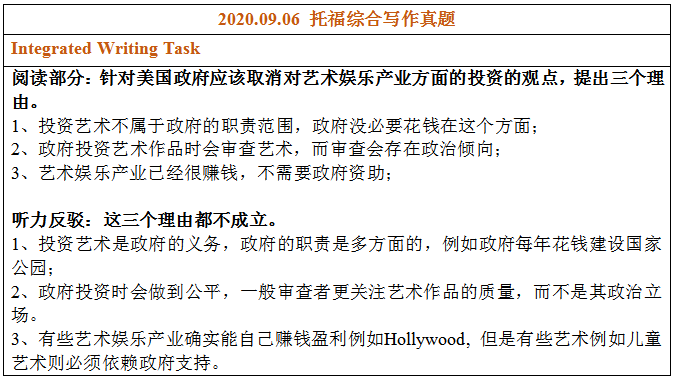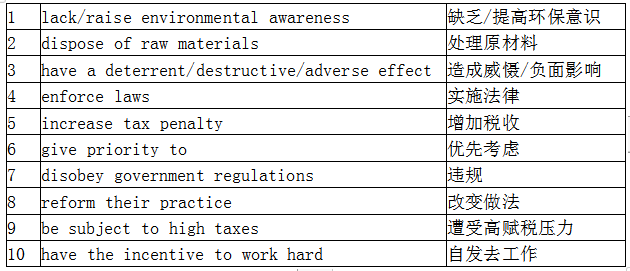
武汉新航道学校 曹优优

本场托福考试重复了2019年7月7日旧题,社科类的话题考察频率相对较低, 给出的材料通常会包含重要的例子,这些例子需要考生留心。一般阅读部分会提到支持某政策的理由,或者该政策难以实施的原因,考生要先理清阅读,合理预判听力,避免因阅读部分没有读透导致失去对听力逻辑的把握。
Keywords: ban, implement, regulation, legitimate, commercial arts, funding, political preference等。
TPO中关于政策的综合写作有TPO1/20/41/46/53。
TPO20 Let It Burn
阅读部分:
总观点:Let It Burn不灭火政策应该被取代,因为它会造成3种危害,以黄石公园大火为例:
• 烧焦植被;
• 野生动物逃跑或烧死;
• 造成游客流失,影响经济发展;
听力反驳:
这三个负面影响并不完全正确。
• 植被烧焦,但会长出新植被;
• 野生动物会恢复,食草动物会带来捕食者,食物链加强;
• 大火很少发生,游客第二年又来了。
•
TPO53 Tax on Unhealthy Products
阅读部分:
总观点:支持对有害健康的产品征税,有3大理由:
• 征税会阻止人们不健康的行为,例如让人少抽烟;
• 征税是很公平的,抽烟者交税等于抵消不健康饮食带来的就医费用;
• 税收可以用之于民,发展基础建设;
听力反驳:
这三个理由并不成立。
• 征税不会导致抽烟和饮食不健康的行为减少;
• 不公平,因为忽略了人均收入差异,收税加重低收入人群的负担;
• 政府可能对税收产生依赖,从而放松管理来罚更多税;
•

题目解析:
9月6日的独立写作重复了2019年9月22的旧题,题目先提出一个现象问题--有些公司提供产品或者服务时会破坏环境, 然后针对这个问题,有些人提出解决办法是政府加大惩罚或税收罚金,有些人认为有其他更好的方法,这是道二选一的题型。本题难度在于:,审题时可能有同学误以为要同时探讨企业是否环保和政府是否应该加大惩罚这两个问题,没能正确理解题目;第二,题目涉及到环境,商业和政府多方面,要求学生掌握相关的话题词汇。
我们比较快的破题思路是选择有其他办法,很容易展开2个主体段:1. 加大惩罚不那么有好处,例如很容易影响企业的生产力;2. 列举出1个或多个其他更好的方法,例如净化装置的研发。 然而, 如果立场是认为加大惩罚很不错,又可以怎么展开呢?我们不妨站在那些公司的角度出发来进行头脑风暴,从准备生产到销售出去需要考虑的有哪些因素?成本预估与控制,原材料供应,生产设备,销售渠道,运输方法,消费者需求等等。本文选择支持加大惩罚,主要从企业成本控制和消费者需求两方面来进行解释。
When manufacturing products or delivering service, some businesses might damage the environment. How can we address this problem? As far as I am concerned, I reckon that the government should give priority to increasing penalties and fines on those product and service providers.
First of all, levying taxes can have a deterrent effect on entrepreneurs who fail to take green measures. It is easy to understand. As an old saying goes, wealth is the most important for businessmen, a consensus among the public. If manufacturers or merchants are subject to high taxes, they cannot maximize profits. Thus, it is not strange to find out that rare factories or stores are willing to pay extra taxes or fines. Meanwhile, it is worth mentioning that attempts to save money are mainly responsible for industrial pollution. To be specific, some manufacturers are using relatively economical but less eco-friendly raw materials for the sake of cost-effectiveness. However, when disobeying government regulations will lead to a heavier financial burden than changing raw materials, will those enterprises reform their practice? The answer is in the affirmative.
Also we cannot ignore consumers, a large group who conduct their purchase often based on good product reviews and brand images. Once a company is fined for damaging the environment, its reputation becomes worse and the public can soon know because news has wings. The company then has to suffer because consumers will easily turn to other merchants who can provide similar service or products and have a better reputation. For example, Whenever I go out shopping, I always notice at least a store of Apple on the street. Imagine what would happen if Apple were fined for damaging the environment? Would consumers still go to its stores? Of course not. The reason is simple. With a bad reputation of not protecting the earth, Apple users might easily change their attitudes towards Apple products and turn to other brands who are more environmentally friendly. If companies do not want to disgrace themselves or let customers down, they will have the incentive to reduce environment damage.
To put it in a nutshell, harsh penalty can deter pollution.
